Earth Day at Florence Fang Community Farm (FFCF) was a feast for the senses: blue skies and verdant greens offset by blooming wildflowers, the smell of soil, and the conversation of food pantry participants and farm volunteers mixing with bird calls and Chinese folk songs.
Nestled in the heart of the Bayview, FFCF is a “community center, outdoors,” in the words of Director Ted Fang. In addition to cultivating the land, FFCF runs a farmer’s market-style food pantry that opens at 9 a.m. each Saturday to serve the community with fresh fruits, leafy green vegetables, and proteins, provided by the Food Bank. The farm also provides the harvests of the season to pantry participants!
“A Community Center”
As one of the most productive urban farms in the Bay Area, we’re not surprised to see swaths of volunteers showing up throughout the morning in response to FFCF’s call for an Earth Day volunteer workday. Many of the longtime volunteers arrived earlier in the day, some stopping to pick up groceries at FFCF’s food pantry, and others heading directly over to the farm to begin tending to the land. 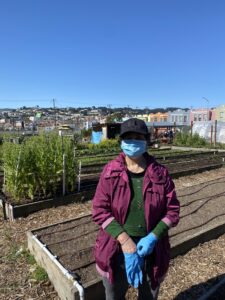
Some regular volunteers like Ms. Chang, who we met after picking up her groceries, have a multifaceted relationship with the farm. As a retiree, she first came to the farm in search of socialization and something to do with her free time. Since then, she’s brought her sister, daughter, and grandchildren into the fold: “I enjoy volunteering at the farm because it is a community center, but for growing food! I get my exercise through this endeavor, bring home delicious harvests, and have a lot of fun along the way. You’ll have to come visit us when we put on talent shows. We love to sing and dance.”
Another of FFCF’s longtime volunteers, Mrs. Li, offers to take us on a tour of the farm. As we draw closer to the community plots, scattered groups of elders are hard at work watering, thinning out crops to provide adequate space for growth, and weeding the beds. True to Ms. Chang’s word, several women working on the same plot join in singing Chinese folk songs, their harmonies joyfully carrying across the farm. One volunteer is nonchalantly placing some of FFCF’s bees on the flowering pea shoots with his bare hands, so they can pollinate the crop.
Unifying Roots
FFCF was originally founded as a gathering space for Chinese immigrants moving into the Bayview neighborhood – a historically Black neighborhood in San Francisco. Over the years, it morphed into a space to serve the broader Bayview community. In 2020, it was renamed from the “Asian Community Garden” to “Florence Fang Community Farm” to reflect that intention, while honoring Ted’s mother and 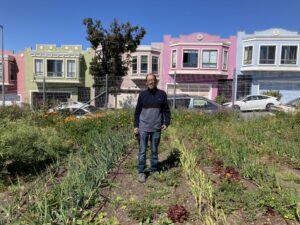 her history of civic contribution.
her history of civic contribution.
Additionally, FFCF houses a Black Organic Farmers program, started by Bayview born and raised Farmer in Charge Faheem Carter. Through this model of self-directed organizing and programming of different Bayview communities, volunteers at FFCF cultivate crops native to their culture and heritage. As Ted says, “It’s important for everyone to be comfortable with the food they want to eat and have control over their food. Food sovereignty gives people control of their food, and that’s what we’re doing.”
Food sovereignty is a radical shift for this neighborhood, as the Bayview has historically been subject to food apartheid due to racism, redlining, city neglect and disinvestment. That’s why the farm is such a critical resource for neighbors – and why the Food Bank is honored to support FFCF’s mission of bringing in even more healthy, fresh foods to the neighborhood via their food pantry.
The Farm, Beyond Food
The impacts of the farm go well beyond fresh vegetables to take home at the end of a workday. For many at FFCF, including many of the Chinese elders present at the Earth Day workday, volunteering has led to fruitful friendships. Some volunteers were even inspired to buy smartphones for the first time and download WeChat [a Chinese messaging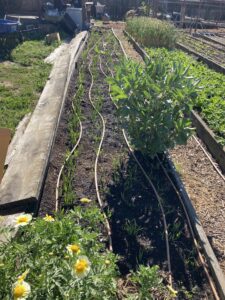 app] to stay in touch after leaving the farm.
app] to stay in touch after leaving the farm.
Farming is networking: you put green onions in one plot, napa cabbage in the other, and the byproducts make the soil richer for the other crops, building networks of nutrients. And this is also reflective of communities above the ground. At its heart, this is the definition of community building. You might come to volunteer or harvest vegetables and end up also reaping the rewards of a thriving network of relationships.
Like Mrs. Li explained to us of the abundant plant tong ho [chrysanthemum greens], “you’ll see it everywhere in the plots, because it keeps volunteering itself,” or self-seeding. In this same way, the volunteers who continue showing up, tending to the land, and making connections are creating their own abundance.



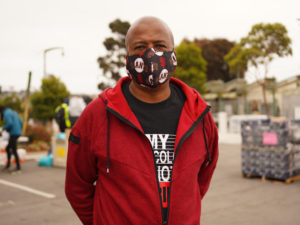 “Although our church can’t fellowship in person and the doors for the church are closed, we like to say that the church is still open and we’re still doing the work,” explained Minister Damonn White, who spends his Thursdays at the Pop-up Pantry Cornerstone now hosts in partnership with the Food Bank.
“Although our church can’t fellowship in person and the doors for the church are closed, we like to say that the church is still open and we’re still doing the work,” explained Minister Damonn White, who spends his Thursdays at the Pop-up Pantry Cornerstone now hosts in partnership with the Food Bank.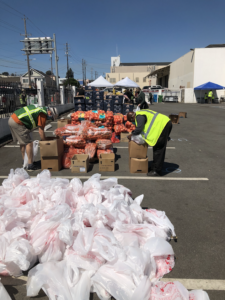 reporting that they did not have enough food in the last two weeks.
reporting that they did not have enough food in the last two weeks.
Share